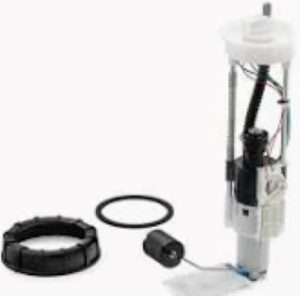Fuel pump pressure is one of the most critical factors in any vehicle's performance, mainly when optima mixture conditions of air-fuel mixture for combustion are to be maintained. Most engines require a range of fuel pressures between 30 and 60 psi to create conditions suitable enough for proper combustion. If this pressure cannot be achieved to such a recommended level, the mixture then becomes "lean," with much air in it and not enough fuel. A lean mixture produces incomplete combustion that can drop engine horsepower as much as 15%, reduce responsiveness to the throttle, and increase the possibility of misfires.
Fuel pressure that is too low also throws off the timing required for injectors to open and close, and that timing is integral to keeping fuel economy and efficiency relevant. Reports from the automotive service industry indicate that cars with problems in fuel pressure can drop 10-20% in fuel economy because the engine uses up more fuel, trying to make up for the insufficient supply. Inconsistent fuel pressure may also cause a rough idle and hesitation during acceleration; many times, this leaves the driver in need of refueling more often. The consequent decrease in performance also resulted in not only higher fuel consumption but also higher emissions, as the incomplete combustion cycle sends too many hydrocarbons into the exhaust.
High-performance and turbocharged engines need even higher fuel pressure, sometimes above 100 psi, because of their need for even more fuel. For example, high-performance racing motors or vehicles that do heavy towing require high-output fuel delivery systems that can handle very high pressures to enable these motors to achieve their full potential without the slightest possibility of fuel starvation. Low pressure in such motors could not only lead to loss of power but also possible overheating due to insufficient fuel, which acts as a coolant within the combustion chambers.

Too-high fuel pressure produces a "rich" mixture, wherein too much fuel and not enough air create lousy combustion. Very rich mixtures burn more fuel; some vehicles have demonstrated a 5-10% loss in fuel economy during such a condition. Rich conditions can leave residue on spark plugs that hampers their ability to function properly and promotes poor fuel burning. Long-term rich fuel conditions can also destroy the catalytic converter; this is an expensive repair costing drivers up to over $1,000.
In older cars, fuel pump problems become a common complaint since pumps can weaken with time. Statistics have shown that vehicles with over 100,000 miles are much more likely to develop fuel pump problems and cause erratic delivery of fuel. The most important thing a mechanic will say is: "Regular checks on the fuel pump and filter can prevent costly repairs down the road." How regularly the filter is replaced, approximately every 20,000 to 30,000 miles, can extend the life up to 30% of the fuel pump.
Optimum health, fuel efficiency, and delivery of real power from an engine all rely on properly maintained fuel pump pressure. With modern fuel pump technology, all bases are covered to maintain pressure within specifications more efficiently, but routine maintenance is still paramount. By and large, using a good fuel pump means smoother engine performance and higher economy. For further discussion on maintaining fuel pump pressure and how it affects vehicle performance, refer to Fuel Pump.
